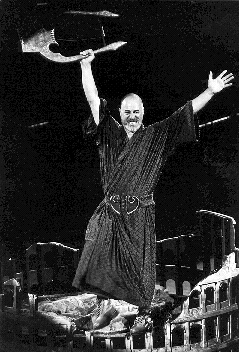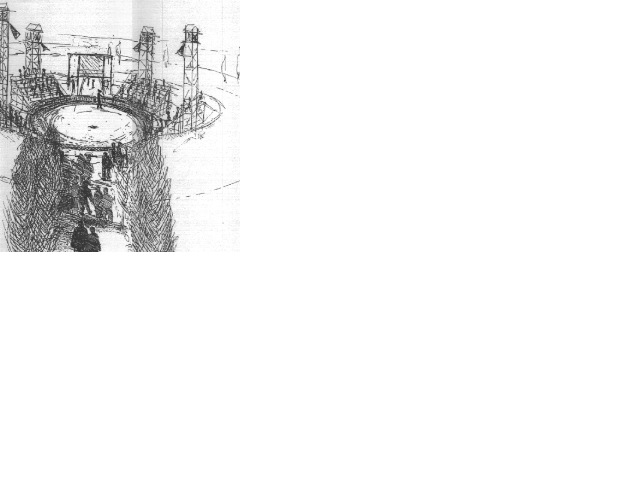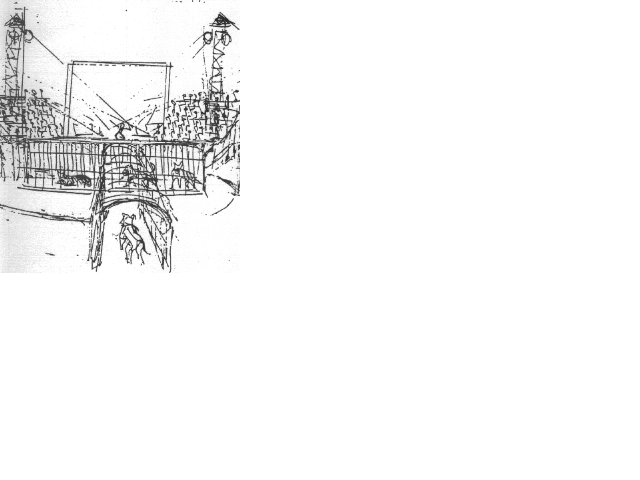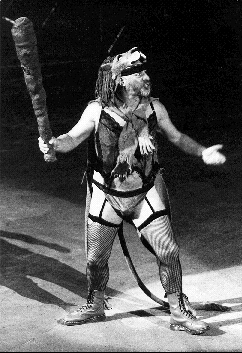 FEATURES ROMAN STAGINGS:
FEATURES ROMAN STAGINGS:
Marcus Aurelius: The Kaisers of Carnuntum

Marcus Aurelius: The Kaisers of Carnuntum
Written and directed by Tony Harrison
June 2-3, 1995
Roman Amphitheater
Petronell Carnuntum
Austria
By Marianne McDonald
University of California, San Diego
E-mail: mmcdonald@ucsd.edu
Tony Harrison is a poet who understands the relationship of opposites. He sees how death defines life. In his poem, 'A Kumquat for John Keats,' he observes:
Then it's the kumquat fruit expresses best
how days have darkness round them like a rind,
life has a skin of death that keeps its zest.
Well-versed in the writings of the pre-Socratic philosopher Heraclitus, whose aphorisms include 'everything flows', 'the road up and down is one and the same', and 'unseen harmony is stronger than the seen'(1), Harrison understands the underside of civilization. He shows the barbaric core which defines civilization, as death defines life. We do not care about most characters in Harrison. He works more with principles, politics and shock effects. He also rarely repeats a performance, and has an aversion to having his work taped, so it is unlikely that we shall have a chance to view this again. (The filming of his Oresteia was disastrous, with a muddled sound track and the masks seen in close-up shots which were intended only to be seen at a distance.)
Harrison believes in using a space and also the language and history of the places where he performs his plays. Carnuntum was offered to him by Piero Bordin, organizer of the Fourth International Symposion Art Carnutum, whom he met at Delphi. He saw it as a great space to work out some of his own hostility with the Germans: the bombings he himself witnessed in his own country. He has written about this in his poetry, and in introductions and other work. Harrison has always preferred the Greeks to the Romans, and is at heart a pacifist, although he is well aware of the dark side in his own nature. He is Marcus Aurelius, and he is Commodus.
History insists on seeing only the contemplative, peaceful side of Marcus Aurelius, and only the monstrousness of Commodus. One indulges a basic pleasure of man, the other tries to control man's pleasures for the greater good. One sees the instant of gratification, the other the time it takes to build things up so that society can be benefitted rather than an individual. This division is also not so easy: every human being has a dark side. In Marcus Aurelius, which Harrison has said is his best work, the poet shows us the true traditional use of a colosseum: the slaughter of beasts. Yet Carnutum is also the place that Marcus Aurelius wrote his Meditations. The plot shows the gentle cultural veneer as a sham: underneath every Mozart is a Hitler: this is shown through Commodus as the underside of Aurelius.
Harrison enlisted several colleagues from the Royal National Theatre in London to help him bring his vision to life. Composer Richard Blackford and designer Jocelyn Herbert had collaborated with Harrison on his satyr- play Trackers of Oxyrhyncus. Herbert's set, constructed primarily of bolted and welded metal, placed the stands for the spectators over cages where lions and tigers paced and roared when red meat was spread out before them. One night two bears got loose, and the main actor, Barrie Rutter, playing Commodus, was left chained to the lion/tiger cages, without another actor in sight to help him: they were off trying to round up the bears. This was truly death defining life. Everyone was at risk.
Orpheus, the poet (and stand-in for Harrison, whose passport reads in the space for profession, 'poet'), begins the drama. He is played by a Czech lion-tamer, Jaro Frank. 'Orpheus' plays his lyre for the animals, and they become quiet. A chorus sings excerpts from the Meditations in various languages. They are said to represent 'the flow of time and the Danube.' Marcus Aurelius is on a watchtower, and he speaks about history, as he surveys the scene before him, mentioning 'Caesar, Stalin, Ceauscescu.' It is interesting that Hitler is never mentioned by name, but he is the 'Kaiser' on everyone's mind. Marcus Aurelius represents the bright and philosophic side of civilization; he says, 'Rome had to be an Hercules/ to turn barbarians like these/ into cultivated Viennese.'
Now Commodus enters, with sirens, machine-gun fire, searchlights, and the sound of a helicopter accompanying him. He appears with a sign he has ripped from the roadside, saying Amphitheater II. He jokes about the local beverages, asking for Kaiserwein, and is dismayed to see the Caesars commemorated are Marcus Aurelius, Septimius Severus, and 'Dio-fucking- cletian.' He has been omitted.
Commodus then calls the sign-maker out of the audience, thanks him and kills him, hitting his head with the sign post, crushing his skull. Commodus shows his true nature, and claims he has restored the Amphitheater to its proper function: killing. Trumpeters sound their fanfare and four speakers broadcast the roar of 50,000 people in the amphitheater. Lights shine on a model of the Colosseum in Rome.


Commodus lays out a map on the amphitheater floor. He reviews the conquests of the Romans: East, South, West and North. Soldiers enter in riot gear and bang their clubs on their shields. Commodus asks the body to be taken away (there is a chorus of Unco Trahatur):
First the boring part, drag this bugger's body off
and hack it into segments for these hungry beasts to scoff.
Drag this doomed Disneyfier off and bring him back
hacked into morsels for the lions' mid-day snack.
And hack they do. 'A blood-dripping sack brought back with an arm sticking out.' Commodus says, 'I thought at first I'd let you watch his body being hacked /to wean you off Greek fiction and onto Roman fact.' Commodus gives the sack to Orpheus and tells him to feed the animals. Orpheus says he is afraid. Guards lead off Orpheus to the cages. Commodus sets out some of the meat in the Colosseum and claims it represents various animals from the countries conquered by Rome. He carries the bleeding pieces to the map, and sets them down in the various countries. As Commodus stands triumphantly in the center of the Colosseum surveying the map of empire, we hear Marcus Aurelius singing in Greek healing words from his Meditations. Women enter, representing the conquered countries, pick up the meat laid on their countries, and wrap the pieces in their national flags. They swaddle the pieces, and treat them as their murdered children. They drop the meat at Commodus' feet; Commodus drives them away with a scream.
There is a brilliant moment when Commodus encourages the audience to indicate their choice for life or death (of a victim, presumably), by the sign of thumbs up or thumbs down. Then he says, 'You see how democratic dealing death can be.' This Commodus goose-stepped onto the acting space, so the point was not lost on the Austrians: they themselves shared responsibility for the death camps.
Commodus says he will become Hercules. As they strip him, 'He is revealed as wearing a woman's bra, suspender belt, and silk knickers and stockings.' (At this point many of the Austrians walked out). Commodus teaches the audience some mythology, the tale of Hercules' slavery to Omphale, when he was forced to 'dress in lacy knickers just like these.' Harrison is, of course, crossing lines again. His is a drama of transgression, the transgression of nature herself.

Commodus is explicit about the fact that the dress is not unaccompanied by the activity:
Rules are for weaklings. Oh yes, oh yes
I cross all boundaries not just in dress. And I admit I'm double-doored.
Had piles of poles with birds as poker and as poked by blokes.
COMMODUS FUTUTOR, known to shaft
both sexes, man and beast, both fore and aft.
Commodus humiliates a servant, Julius Bollux, by forcing him to dance an erotic dance, threatening him with death. Marcus Aurelius appears and chides his son. Commodus counters with how Hercules has been taken as a symbol for thriving empires. Aurelius takes the club from his son, who falls on his knees.
Faustina, Aurelius' wife and Commodus' mother, intervenes at this point and promises to maintain the lie that she mated with a gladiator to produce Commodus, so that Marcus Aurelius could have an unsullied reputation. She says she will take on the reputation of a whore, if Marcus Aurelius will recognize his son, and embrace him. She recalls the first killing that her son watched, here in this amphitheater, when he was eleven, and it was Aurelius who invited him. Commodus says,
I remember! I remember, I sat there.
They dressed a man as Orpheus and a bear ripped him to pieces though he played
with panicky desperation a lyre serenade.
His father says he does not remember, and Faustina counters,
No, you were, as always, lost in thought.
You were dictating with averted gaze what was to grow
into the chapter titled Ta en Karnounto.
Father and son circle the map, and then embrace, the blood on Commodus smearing Marcus Aurelius' suit.
Commodus says he will now show the most 'dangerous and savage beast,' and yes, it is himself, man. Orpheus enters, plays his lyre, and men pour out of crates that open at the sound. They are dressed in riot gear, and they 'overpower Commodus and muzzle and chain him like a bear.' Orpheus threatens him, brandishing 'a white cello with the pointed end thrusting forward.' Then he 'rams the point of the cello through the guts of Commodus.'
The chorus enters and sings, Unco Trahatur and make way for Marcus Aurelius with Orpheus at his side, wheeled in on a golden throne, which is propelled by a bear. Tony Harrison, the poet author, enters and drives the amphitheater sign into Commodus' heart. But Commodus shrieks and rises up again, swinging the signpost. 'He removes his bear- muzzle, laughs and bows to the audience indicating that the show is over.'
This is a nightmarish vision but a brutal fact repeated ever since the beginning of political history - a moment of festive liberation cruelly crushed down by the despot.' History flows in recurrent patterns: liberation, despotism, liberation, despotism. A Marcus Aurelius is always followed by a Commodus, and the second Marcus Aurelius is Heliogabalus. Of course, Harrison simplifies history to make his contrast. Marcus Aurelius was in fact a great warrior, who could only write in moments snatched from keeping his empire in order. Harrison shows us antinomies.
Harrison also ridicules the poet: Orpheus is not above murder, nor sitting at the emperor's side. No line is left uncrossed. Harrison's ending is, 'At least it can be said this sign's now right. /A comedy and a tragedy were enacted here tonight.' He is refuted by the corpse reviving. Words are refuted by action. History has a way of nullifying its poets, no matter how they try to change what they see is wrong. As Auden said, 'Now Ireland has her madness and her weather still, /For poetry makes nothing happen.'
But something has happened. We and others have seen something which will not be erased from our memory. Perhaps it is part of a poet's job to make us face history, and the Greek verb for 'I see' means 'I know' in the perfect tense: it was not for nothing that Mnemosyne, or 'Memory' was the mother of the muses. Harrison is the poet of our times who has brutally and brilliantly reminded us of our past, and the bloody basis of civilization, 'You see how democratic dealing death can be.'
NOTES:
(1) panta rei and 'everything flows into its opposite', Life, 15-20, p. 141, vol. I, Diels/Kranz; hodos ano kato mia kai hoaute, 60 Diels/ Kranz; harmonie aphanes phaneres kreitton, 54 Diels/Kranz.
FURTHER READING:
- Marc-Aurele: Pensees, ed. and tran. A.I. Trannoy. Preface, Aime Puech, Bude edition. Paris: Les Belles Lettres, 1964.
- The Meditations of Marcus Aurelius, trans. George Long.
- Great Books of the Western World, ed. Robert Maynard Hutchins, Vol. 12. Chicago, London, Toronto: Encyclopaedia Britannica, 1952.
- Tony Harrison, ed. Neil Astley, Bloodaxe Critical Anthologies: 1. Newcastle upon Tyne: Bloodaxe Books, 1991.
- Marianne McDonald. Chapters on 'Tony Harrison's The Trackers: A People's Tract and Tony Harrison's Medea: A Sex War Opera: Internal, External, Eternal Medea' and Interview with Tony Harrison in Ancient Sun, Modern Light: Greek Drama on the Modern Stage. New York, Columbia University Press, 1992. Also chapter on 'Suzuki Tadashi's Bacchae: No(h) Bacchae,' pp. 59-73.
Marianne McDonald
E-mail: mmcdonald@ucsd.edu
(Tony Harrison, who dislikes writing about his own work, has authorized Marianne McDonald to do so.)
